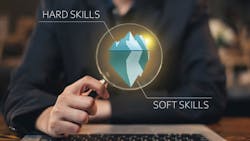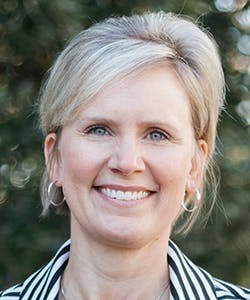Want to be a better industry leader? Improve your soft skills.
You know the stereotype of frontline industrial workers when it comes to soft skills: they're poor communicators with great ideas and a lot of rough edges. But how true is that stereotype really, in an age where good soft skills are required for the average plant worker to succeed on the job? And for managers who do want to polish their skills, what methods are proven to work? Join Lisa Brownlee, the owner and founder at Leader’s Imago, for a conversation on these topics and more.
Lisa holds both BS and MS degrees in chemical engineering. She worked for 11 years for a major engineering and manufacturing company in Columbia, SC, and is also a Lean 6-Sigma Master Black Belt. Her experience spans operations, continuous improvement, training development and delivery, and product assurance.
Listen to Lisa Brownlee on Great Question: A Manufacturing Podcast
PS: This simulation part of the Team Manager Development Center really caught my attention when we were working together on the Unturning Steel panel. Tell us more about how the process goes. It's one day simulation, one day follow up, or a combination of that?
LB: It's actually a 2½-day program. On the first day, participants come in and they just get indoctrinated into what we call Hannibal Placemats Factory, and it's based off of a real-life process, not making placemats per se. But, the participants are managing a team, and the facilitators actually get to play the role of their one of their direct reports.
I, as the facilitator, get to interact with each of my participants in one-on-one interactions, and I get to see first hand, how do they set expectations for me? How do they hold me accountable? How do they involve me in making decisions? Or do they just, you know, fix everything themselves? Are they delegating? How do they run a meeting? How do they do some of the more nuanced things like empathize, and are how flexible and adaptable are they?
We are looking at 12 different competencies throughout this simulated day, this first day, in order to get a first baseline assessment of what they're capable of. How do they show up? Some people are like, “well, can't you fake it? Can't someone come and fake it?” And the way this is designed, yeah, you could fake it for a little while, but you're going to get tired of faking it. What we hear from the people’s managers who attend is, “wow, you really nailed him, in terms of correctly identifying where the strengths are and where the development needs are.”
After that first day we reveal the cards and share what we've been looking for. And the participants begin to reflect on, where did I do that today in this simulated factory, and what did I feel like I did well, and where did I struggle? They're doing a little self reflection and homework overnight. We're also doing some homework, putting together our feedback, because the next morning they get some coaching.
And then the second day is the next day at work. But the second day provides them opportunities for more real-time feedback and coaching on the areas where they have identified they want to work. They are stretching outside of their comfort zone and trying things and seeing, how far can I swing this pendulum on this behavior to where it has the effect? Or do I take it over the top? They are constantly thinking about, how do I do this? What is my intent? What are my options? And the coaches are there to help them think through, all right, how did that go? What went well? What was your intent? Is there a different way that you could do that? What are your options here? And let's explore one of those, let's try that again.
Through that support and coaching, folks get to really explore and practice some things in new ways and just try on new behaviors to see what feels good. What gets me the outcome that I ultimately want? How does this look at work? And that's the coach’s job at the end, on the last half day, it's one-on-one coaching. Folks who come through this program probably don't get this level of high quality coaching and attention that they get at the Team Manager Development Center. It's about translating what did they learn back to work, because that's where the rubber meets the road.
PS: Right. And I think one of the beautiful things about the program is that it takes what people I think often consider a very unstructured environment – social skills, soft skills, communication skills, leadership skills – and it reinforces through the act of immersion and then feedback, the notion that actually you can apply a process to what seems unstructured and generate improvements. For the engineering mindset that I think that's really key, people look for that problem/solution, problem/solution format, and the degree to which folks who do need a little bit of leadership coaching or even soft skill coaching can understand, “wait a second, soft skills really aren't that soft. There is a certain hard process I can follow to improve and then see positive results in the job.”
LB: Yes, and I think that what the coaches are able to offer are some tips or tricks to make it more process oriented. Because when we're operating out of our most natural instincts, in some cases that’s just fine to engage in a particular situation in your most natural state. And then other times we really do need people to take a beat and try a different approach. So it's like, what will trigger you in the real world to remember to ask an open-ended question, or not to interrupt, or to step out of your comfort zone and speak up in a meeting when you normally are the wallflower, because you have something important to offer. And some of it is helping people recognize what their internal barriers are. There's a lot there. It's deep.
PS: It is deep. You're making me reflect on some of my own experiences. I grew up in a very conflict-averse household, and that will not get you very far in the business world, if you don't understand how to raise issues with people and work out conflicts because those inevitably arise. So I can only imagine the other experiences that engineers bring.
Quick story: my first formal job was a teacher at Ohio State University, and I taught the writing electives for engineers. The standard stereotype of engineers is they don't know how to communicate, or they don't communicate well, or they don't write very well. Well, of course, during the process of teaching these writing classes, I found the reverse to be true, as long as there was (1) trust built up between the students and the teacher, and (2) open-ended questions. You may have had to ask maybe one or two more open-ended questions than usual, but these were people who are used to giving very direct answers to questions. They had the knowledge, they had thoughts about what they were experiencing. I think just the confidence that someone wanted to hear more of what they had to offer, and then see them translate that onto at the time pen and paper (now it's keyboard). It was a brilliant experience.
At the end of the class, one of these questions I asked was based on Shakespeare's The Tempest, which we had read. And I said, OK, you're engineers, design a flag for the nation that the sailors find themselves shipwrecked on, and explain your reasoning, 1-2-3. It was a chance to exercise the creative the muscles and also the analytical muscles. It was wonderful to see the output that these students provided, once they believed they would be listened to, and believed that what they had to say was going to matter in this classroom. You know, it wasn't an engineering class. It wasn't mechanics. It wasn't thermodynamics. It was a writing class. So as long as they understood what they were working on and what they were learning, they achieved! It was fantastic.
LB: Well, you said the word “trust” in there and I think that's one of the important aspects of the Team Manager Development Center. These coaches have to quickly build a relationship with each of their participants in order to create the space for there to be some trust, so that the participants can be a little bit vulnerable.
It is uncomfortable to try things differently. When I was a new manager, my company actually sent me through the Team Manager Development Center. And I think that's when I fell in love with it, because when I left there, I had watched myself on video as part of the program, and done a lot of reflection and gotten a lot of coaching and feedback. And I knew exactly what I needed to do to be more effective when I got back to work.
In theory I knew how, and I had gotten to practice it in the program itself and it was awkward, right, trying things new and stretching out of my comfort zone. It did feel sort of temporarily vulnerable and going back and trying to apply it in real life also felt a little temporarily vulnerable, but that's where we start building these muscles is through practice. It’s just like weight lifting of any kind. I think that having the support and encouragement of my coach during the TMDC and of my manager when I got back to work, knowing what I was working on, is what helped me lean in to that vulnerability and it required that trust, which I think is so critical for development.
PS: I think that takes us back to one of the first questions we talked about, which is the sort of rough exterior of the average manufacturing worker, how that's a stereotype. And I do think there is a certain truth in that these environments have been traditionally masculine, maybe a little bit less openly vulnerable. But my experience working in the sector for the past 10 years has been that male or female, once you do make that connection, the vulnerability happens and then real change occurs.
LB: Yes. Almost everybody who comes through the program says “that felt just like work. That was one of the best training programs or learning experiences I've ever been through.” And some of them even say something like, “I wish there was another day.” And I think that the “I wish there was another day” is coming from, “I was really working hard but I was making progress and I was getting a lot of feedback about how I was doing.” People are hungry for that feedback and I think that our newer generations coming into the workforce are expecting that. And we need to equip our supervisors and managers who are Millennials and Gen Xers on how to do that well.
PS: I certainly hope that the more Millennials and GenX and GenZ take the reins at HR, especially too in leadership, that they do set aside some of the budget for training. I'm hopeful.
Well, and you likened it also to adding and growing new muscle mass over time. You don't gain 30 lb of muscle during your first workout. What you do is you go back over and over, add a little bit more weight to the bars, maybe run a little further if you're a long distance runner. Before you know it, you're going to run 26 miles or you're going to bench your own weight. But it doesn't happen the first time, does it?
LB: No, no. And it requires tearing of the muscle to grow the muscle. So there's pain, there's pain in growth.
PS: I hear you. That a buddy of mine who was a runner who was inspiration to me said that you have to fall in love with the pain a little bit, and just accept that it's going to lead to better things though.
About the Author

Thomas Wilk
editor in chief
Thomas Wilk joined Plant Services as editor in chief in 2014. Previously, Wilk was content strategist / mobile media manager at Panduit. Prior to Panduit, Tom was lead editor for Battelle Memorial Institute's Environmental Restoration team, and taught business and technical writing at Ohio State University for eight years. Tom holds a BA from the University of Illinois and an MA from Ohio State University

